
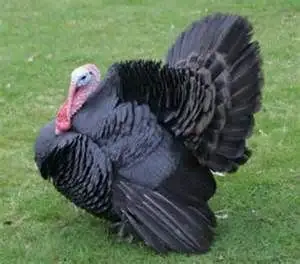
MIDGET WHITE TURKEY
$20.00 – $150.00
Midget White Turkey Care and Management Essentials
Midget White turkeys, known for their plump breasts and rich flavor, require specific care to ensure their health and productivity. Many poultry enthusiasts, especially in Indiana and England, struggle with the unique needs of these birds. This post will cover essential aspects such as creating a balanced diet, effective housing solutions, and health management strategies. By understanding these key areas, readers will enhance their Midget White turkey care practices and improve their livestock outcomes, addressing common challenges in raising these turkeys successfully.
Understand the Unique Requirements of Midget White Turkeys
Midget White Turkeys require specific conditions for optimal care and health. Identifying the ideal habitat for their growth, understanding their feeding preferences, and nutritional needs are fundamental. Additionally, exploring social structures within their flocks, managing environmental factors, and recognizing breed-specific health concerns are vital elements. Preparing for seasonal changes will further support their well-being, enhancing overall management practices.
Identify the Ideal Habitat for Raising Midget White Turkeys
Creating the right habitat for Midget White Turkeys involves providing ample space that allows for natural behaviors and social interactions. In regions like North Dakota and Wyoming, where the climate can vary significantly, proper shelter is essential to protect them from extreme weather conditions. A spacious, well-ventilated coop with access to outdoor runs will facilitate their growth while preventing stress and potential health issues related to overcrowding.
Feeding practices also play a crucial role in habitat management, influencing the birds' weight and overall health. Midget White Turkeys thrive on a diet rich in proteins, vitamins, and minerals, similar to that of ducks and buff breeds. Utilizing appropriate feeders within their habitat ensures that they have consistent access to nutritious food. This not only promotes robust growth but also supports a harmonious environment for these unique birds to flourish.
Learn About Feeding Preferences and Nutritional Needs
Midget White Turkeys have distinct feeding preferences that cater to their growth and health requirements. A well-balanced diet is essential, which should include high-quality grains, proteins, and fresh greens. In regions like Guam and Connecticut, where local feed options may vary, ensuring access to nutrient-rich feed can contribute to the birds' development and well-being.
Explore Suitable Social Structures Within Turkey Flocks
Midget White Turkeys exhibit unique social structures that significantly influence their overall health and productivity. Observations from breeders in states such as Tennessee and Rhode Island show that establishing a stable hierarchy within the flock can minimize aggression and stress. Providing ample space allows these turkeys to establish their pecking order naturally, which is vital for their social well-being and efficient feeding behaviors.
Manage Environmental Factors for Optimal Health
Managing environmental factors is fundamental to ensure the health of Midget White Turkeys. In states like Iowa and California, temperature stability is critical. Providing adequate shade during hot months and ensuring warmth in colder seasons helps maintain their well-being and improves the taste of the meat, as stress can adversely affect flavor quality.
Ventilation within the coop is also essential for preventing respiratory issues in fowl. A well-designed space minimizes moisture buildup and ammonia levels, contributing to healthier birds. Farmers who prioritize these environmental considerations often see improved growth rates and vibrant color in their flocks, further indicating effective management practices that support optimal health.
Recognize Breed-Specific Health Concerns to Monitor
Midget White Turkeys are susceptible to certain breed-specific health concerns that require attentive monitoring. Conditions such as respiratory infections can emerge if housing lacks proper ventilation, especially in warmer climates like South Carolina or during harsh winters in Alabama. Additionally, breeders should be aware of potential issues related to stress, which can affect meat quality, especially when turkeys are raised alongside other livestock like cattle.
Prepare for Seasonal Changes Affecting Turkey Care
Preparation for seasonal changes is fundamental for the health of Midget White Turkeys, especially in regions like New Hampshire and Vermont, where weather conditions can fluctuate dramatically. During the colder months, ensuring proper insulation and heating in the coop is essential to protect them from freezing temperatures, which could lead to stress and health issues. As temperatures rise in the summer, providing ample shade and adequate hydration becomes equally important to keep the turkeys comfortable and prevent overheating.
In addition to environmental adjustments, careful attention to feeding and insemination practices throughout the seasons is crucial. Producers in Pennsylvania, for instance, may need to adapt the diet to include more energy-rich feed during winter or provide fresh greens during warmer months. Understanding these seasonal needs allows turkey owners to implement effective management strategies that support the overall well-being and productivity of Midget White Turkeys throughout the year.
Create a Balanced Diet for Optimal Midget White Turkey Growth
To promote optimal growth in Midget White Turkeys, careful attention to their diet is essential. Owners should determine the best feed types based on growth stages, incorporating grains and fresh greens into their daily meals. Supplementing with vitamins and minerals enhances overall health, while a well-planned feeding schedule supports steady development. Regular monitoring of water intake and hydration is also crucial, along with adjusting diets according to the age and weight of the turkeys. Understanding these components will benefit hobby farms in regions like South Dakota and contribute to the success of raising these heritage turkeys.
Determine the Best Feed Types for Growth Stages
For Midget White Turkeys, selecting the appropriate feed types at various growth stages is essential to promote healthy development. In Nevada, producers should focus on formulations that offer significant protein content, particularly for young birds, to support their rapid growth. Variants of grower feed high in nutrients can also enhance performance, ensuring these turkeys reach their ideal weight efficiently while maintaining overall health.
As Midget White Turkeys transition into adulthood, owners can introduce grains and specific supplements to maintain strength and weight. In environments where heat can be a concern, such as during summer months, adding electrolytes to their diet may help keep them hydrated and reduce stress. Understanding these dietary adjustments not only benefits the turkeys' growth but also aids in preventing health issues commonly seen in poultry, similar to those affecting bronze turkey variants raised alongside sheep in mixed farming settings.
Incorporate Grains and Greens Into Your Turkey Diet
Incorporating grains and greens into the diet of Midget White Turkeys is crucial for achieving optimal growth and health. Owners in states like Arkansas and Michigan can enhance the birds' nutrition by providing a mix of whole grains and fresh vegetables. These additions not only supply essential vitamins and minerals but also improve digestive health, which is imperative for effective weight gain and overall performance.
Additionally, integrating greens such as clover and dandelion helps mimic a wild turkey's natural foraging behavior, offering both mental stimulation and nutritional benefits. In regions like Hawaii, farmers can benefit from selecting local plants that provide the right balance of nutrients while managing pests that may affect feed quality. By focusing on these dietary elements, turkey keepers can ensure their Midget White Turkeys thrive, leading to successful flock management year-round.
Supplement Vitamins and Minerals for Enhanced Health
Supplementing the diet of Midget White Turkeys with vitamins and minerals is essential for their overall health and productivity. Nutrients such as vitamin E and selenium play a significant role in boosting the immune system and preventing various diseases. For turkey keepers across the Americas, investing in high-quality supplements can lead to healthier birds that are better equipped to thrive in varied environments, whether in a backyard pen or larger farming operations.
Including specific multivitamins in the feed can enhance growth rates and meat quality, mirroring practices observed with the Beltsville Small White breed. Additionally, these supplements can aid in food preservation and transport, ensuring that turkeys remain healthy during breeding or while traveling to market. Addressing these nutritional needs not only improves the birds' health but also maximizes yields for farmers and enthusiasts alike.
Establish a Feeding Schedule That Supports Development
Establishing a feeding schedule that supports the development of Midget White Turkeys is crucial for optimal growth and health. Owners in Virginia, for example, benefit from creating a detailed menu that aligns with the turkeys' age and nutritional requirements. Consistent feeding times, along with access to fresh pasture for foraging, enhance the overall well-being and flesh quality of the birds while reducing the risk of disease related to improper nutrition.
Research conducted by the University of Massachusetts indicates that structured feeding regimes can significantly impact growth rates. By offering age-appropriate feed at regular intervals, turkey owners can ensure that nutrients are efficiently absorbed, leading to stronger birds. By carefully managing the feeding schedule, producers can effectively meet the dietary needs of Midget White Turkeys, ultimately fostering a robust and thriving flock.
Monitor Water Intake and Hydration Levels Regularly
Monitoring water intake and hydration levels is crucial for the well-being of Midget White Turkeys, as it directly affects their growth and overall health. Regular access to clean water ensures that the birds are hydrated, which supports effective digestion and nutrient absorption. Farmers practicing sustainable agriculture should incorporate easy-to-reach water sources, especially when turkeys are grazing, to encourage consistent drinking habits and optimize performance.
Additionally, the importance of security in their watering systems cannot be overlooked. Ensuring that water remains clean and free of contaminants not only prevents health issues but also promotes robust growth. By closely observing water consumption patterns, turkey owners can identify any potential hydration issues promptly, leading to timely interventions that enhance the birds' health and productivity while maintaining manageable membership price for care solutions.
Adjust Diets According to Age and Weight of Turkeys
Adjusting diets for Midget White Turkeys according to their age and weight is critical for their overall growth and health. Young birds require diets high in proteins to support rapid development and muscle growth, while adult turkeys benefit from a diet that maintains their weight and health. Farmers in Delaware can refer to resources available through The Livestock Conservancy's product page to find suitable feed formulations specifically designed for different growth stages in poultry.
As Midget White Turkeys grow, their nutritional needs change, necessitating careful monitoring of their diet. For instance, adjusting feed quantities based on the turkeys' weight can prevent obesity or deficiency-related health issues. By focusing on this approach, farmers can enhance their flocks' well-being and productivity, ultimately contributing to successful poultry management practices in their operations.
Implement Effective Housing Solutions for Midget White Turkeys
Selecting the right construction materials is essential for building sturdy shelters that support Midget White Turkey agriculture. Spacious enclosures are critical to prevent overcrowding, while proper ventilation and light ensure healthy living conditions. Providing suitable nesting spaces for laying and incubating eggs is vital, along with maintaining cleanliness to promote hygiene. Additionally, installing predator-proof systems will protect flocks in areas like North Carolina and Nebraska.
Select Construction Materials for Sturdy Turkey Shelters
Selecting the right construction materials is vital for building strong shelters for Midget White Turkeys. Utilizing durable materials such as slate for roofing not only provides longevity but also aids in effective weather resistance, essential in regions like Illinois and Arizona where climate can fluctuate. These robust structures ensure that the turkeys remain safe from harsh conditions while also promoting adequate nesting spaces for egg-laying activities.
In North America, combining materials like treated wood for the frame and metal for the roof can create a secure environment for turkeys. Ensuring proper ventilation with high-quality screens prevents respiratory issues while safeguarding against pests. By focusing on practical construction methods, turkey farmers can establish a sustainable habitat that supports the health and productivity of their Midget White Turkey flocks.
Design Spacious Enclosures to Prevent Overcrowding
Designing spacious enclosures is crucial for the health and well-being of Midget White Turkeys, particularly since they are a rare breed. These turkeys require ample room to move freely, spread their feathers, and engage in natural behaviors, which is essential for reducing stress and ensuring overall productivity. In states like Missouri and Georgia, where the climate can vary significantly, providing a well-structured space with proper ventilation will help prevent crowded conditions that could lead to health issues among the flock.
To promote a peaceful environment, the enclosure should be designed to accommodate the turkeys' social behaviors while allowing for easy access to food and water sources. Incorporating features such as spacious feeding areas and durable carts for transporting feed can enhance the management process, making regular care more efficient. By ensuring that Midget White Turkeys have plenty of room to thrive, owners can enjoy healthier birds and increase their success in raising this unique poultry variety.
Ensure Ventilation and Light for Healthy Living Conditions
Proper ventilation and adequate lighting are crucial for maintaining healthy living conditions for Midget White Turkeys. In states like Colorado and New Hampshire, ensuring that coops are well-ventilated helps prevent respiratory issues often seen in poultry. Strategically placed windows and vents allow fresh air to circulate while minimizing moisture buildup and ammonia levels, which can adversely affect the birds' health, especially when sourced from a hatchery that prioritizes optimal conditions.
Light plays a significant role in the growth and productivity of Midget White Turkeys. Natural light exposure during the day supports their biological rhythms, promoting healthy behavior and development. Facilities in Alaska, for example, may require additional artificial lighting during the long winter months to mimic natural conditions, ensuring the turkeys receive enough light for optimal growth. Collaborating with experts from organizations like the Livestock Conservancy can enhance understanding of how light and ventilation contribute to the overall well-being of these birds.
Create Nesting Spaces for Laying and Incubated Eggs
Creating suitable nesting spaces is crucial for laying and incubating eggs when raising Midget White Turkeys. Nest boxes should be positioned in a quiet area within the coop or garden to reduce disturbances, allowing hens to lay eggs comfortably. Using soft bedding materials inside the nest boxes promotes a cozy environment, encouraging hens to use them consistently and ensuring better egg production.
The American Poultry Association emphasizes the importance of providing multiple nest boxes for each hen to prevent competition and stress within the flock. Each box should be large enough to accommodate a turkey comfortably, ideally measuring about 12 inches by 12 inches. This thoughtful setup not only supports successful hatching and raising turkeys but also leads to healthier birds and improved overall flock management.
Regularly Clean and Maintain Turkey Housing for Hygiene
Maintaining cleanliness in turkey housing is essential for the health of Midget White Turkeys. Regular cleaning prevents the buildup of waste and harmful bacteria, reducing the risk of diseases that can spread in flocks. Farmers in Kansas and Oregon should prioritize daily checks and thorough cleanings of coops, ensuring that nesting areas remain hygienic to promote optimal egg production and overall well-being.
In regions like American Samoa, where humidity can accelerate the growth of pathogens, turkey keepers must be diligent with their hygiene practices. Implementing a routine that includes proper sanitation methods, such as using appropriate cleaning agents and ensuring good ventilation, can dramatically improve flock health. Effective shipping practices also require clean facilities to maintain healthy birds, making it crucial for producers to invest time and resources into maintaining their housing environments.
Install Predator-Proof Systems to Protect Your Flock
Installing predator-proof systems is vital for protecting Midget White Turkeys from potential threats. In areas like Kentucky and Utah, farmers often face challenges from wildlife such as raccoons and foxes that can pose risks to their flocks. Utilizing sturdy fencing reinforced with buried barriers can prevent predators from digging under, while secure latches on gates ensure that the turkeys are safe from nighttime attacks.
Farmers in Canada have reported success in enhancing their turkey shelters with additional features such as motion-sensor lights and alarm systems that deter intruders. These proactive measures not only safeguard the turkeys but also contribute to the longevity of this rare breed, reducing the risk of extinction through careful management and protection. By investing in effective predator-proof systems, turkey owners can create a more secure environment that supports the health and productivity of Midget White Turkeys.
Manage Health and Wellness in Midget White Turkeys
Routine veterinary checkups for Midget White Turkeys are essential to monitor their health and catch illnesses early. Recognizing signs of illness allows for swift action, while vaccinations protect against common diseases in poultry. Implementing effective parasite control measures is crucial. Understanding biosecurity practices prevents disease spread, and supporting stress management techniques enhances their overall well-being. Together, these practices ensure the health of turkeys raised in environments like West Virginia and Ohio, including those alongside Royal Palm Turkeys on free-range setups.
Schedule Routine Veterinary Checkups for Turkeys
Scheduling routine veterinary checkups for Midget White Turkeys is essential for maintaining their health and preventing potential issues. Regular examinations allow for early detection of illnesses, ensuring that any health concerns, such as respiratory infections or foot problems, are addressed promptly. Farmers in Wisconsin often rely on experienced veterinarians familiar with local conditions and common issues in turkey stock, which aids in maintaining strong flock health.
During these veterinary visits, professionals can assess various aspects of the turkeys’ well-being, including beak condition and overall growth rates. For example, those using incubators to hatch young Midget White Turkeys can benefit from guidance on appropriate care practices specific to this breed. By fostering a proactive approach to health management, turkey owners can enhance the quality of their flock, ultimately resulting in better production and healthier birds in the long run.
Recognize Signs of Illness and Take Swift Action
Recognizing signs of illness in Midget White Turkeys is crucial for their health and productivity. Common indicators include lethargy, ruffled feathers, and a decrease in appetite or water intake. For turkey enthusiasts in New Mexico, staying informed through local agricultural newsletters can provide timely insights on emerging health concerns, especially those affecting broad breasted white turkey variants that share similar vulnerabilities.
Taking swift action upon noticing any health changes is essential to prevent more severe issues. For example, within orchards where turkeys may be raised, ensuring prompt isolation of sick birds helps contain potential outbreaks. Selective breeding practices can also be beneficial—breeders who focus on health traits may produce flocks that are more resilient to common ailments, ultimately supporting the overall well-being of Midget White Turkeys.
Vaccinate Against Common Diseases in Poultry
Vaccination is a critical component of health management for Midget White Turkeys, ensuring protection against common poultry diseases that can affect their growth and meat quality. Farms in Oklahoma, for example, often administer vaccines to prevent diseases that could hinder the overall performance of the flock, including respiratory infections and fowl pox. Regular vaccination schedules tailored to the specific needs of breeds like the Midget White and White Holland can significantly reduce the incidence of illness, leading to healthier birds and enhanced productivity.
Proactive health measures, including vaccinations, not only safeguard the well-being of Midget White Turkeys but also boost consumer confidence in the meat produced. Farmers who prioritize vaccination establish a strong defense against outbreaks, ultimately preserving the integrity of their flock. By integrating vaccinations into their management practices, turkey producers can navigate challenges, ensuring a steady supply of high-quality meat while maintaining optimal flock health.
Implement Parasite Control Measures Effectively
Implementing effective parasite control measures is crucial for the health of Midget White Turkeys and other domestic turkey breeds, such as the Bourbon Red. Regularly inspecting the flock for signs of parasites enables owners to address any issues promptly. For instance, utilizing medicated feeds or natural remedies, based on trusted recipes developed for turkey care, can significantly reduce parasite presence, leading to stronger and healthier birds. This proactive approach benefits both flock wellness and overall productivity in regions like Maryland, where environmental factors can exacerbate parasite challenges.
In addition, maintaining proper sanitation in turkey housing plays a vital role in preventing parasite infestations. Regular cleaning and ensuring a dry environment help minimize the risk of parasites thriving in the coop. By focusing on these practical techniques, owners of Midget White Turkeys can foster a healthier living space that contributes to the birds' growth and productivity. Taking these steps not only simplifies management but also enhances the quality of the meat produced, appealing to consumers looking for healthy poultry options.
Understand the Importance of Biosecurity Practices
Implementing robust biosecurity practices is essential for maintaining the health of Midget White Turkeys, particularly for purebred strains that require careful management. In states like Minnesota and New Jersey, where turkey populations may be exposed to various pathogens, owners must ensure that all equipment, feed, and clothing used around the flock are sanitized regularly. This proactive approach reduces the risk of disease transmission and enhances the overall well-being of the birds, thereby improving their growth and productivity.
In Louisiana and other regions, it’s critical to limit interactions between domestic turkeys and wild species, especially during hunting seasons. These wild birds can carry diseases that threaten the health of flocks, so establishing physical barriers and separate feeding areas is vital. By prioritizing biosecurity measures, turkey owners foster a safer environment, protecting their Midget White Turkeys from potential health issues that could compromise both their welfare and market quality.
Support Stress Management Techniques for Turkeys
Supporting stress management in Midget White Turkeys is vital for maintaining their health and enhancing their plumage quality. Strategies such as providing ample space and social structures within flocks allow these birds to feel secure and minimize aggression. In Montana, turkey owners can implement additional measures like ensuring consistent pest control, as external stressors can disrupt these sensitive birds and negatively impact their overall well-being.
Regular handling practices also contribute to reducing stress levels among turkeys. Gentle interaction, combined with adherence to the American Standard of Perfection for housing and care, encourages a calm environment. By prioritizing these stress management techniques, turkey keepers can nurture healthier birds that thrive both in appearance and performance, ultimately leading to a more productive farming endeavor.
Enhance Midget White Turkey Breeding Techniques
Selecting healthy parent birds is essential for breeding success in Midget White Turkeys. Monitoring mating behaviors and establishing breeding cycles will optimize reproduction, while proper care of eggs during the incubation period ensures higher survival rates. Identifying optimal hatching conditions and raising pouts carefully during their early stages will contribute significantly to their overall growth. Maintaining breeding records in places like Massachusetts and Idaho helps track lineage and health, supporting effective pastured poultry management.
Select Healthy Parent Birds for Breeding Success
Selecting healthy parent birds is a critical step in achieving breeding success with Midget White Turkeys. Breeders should look for turkeys that display robust physical characteristics, such as clear eyes, strong legs, and healthy plumage, as these traits often indicate overall vitality. Additionally, evaluating the birds' feeding behavior and social interaction can provide insights into their health and suitability for breeding.
An effective breeding program involves monitoring the reproductive performance of the chosen parents. Maintaining accurate records of mating behaviors, egg production, and subsequent hatching rates allows breeders to identify and optimize the best genes for desirable traits in future generations. By prioritizing health and vigor in parent stock, turkey farmers can enhance the success of their breeding efforts and contribute to the sustainability of this heritage breed.
Monitor Mating Behavior and Establish Breeding Cycles
Monitoring mating behavior in Midget White Turkeys is crucial for optimizing breeding success. Breeders should observe the interactions between male and female birds, looking for signs of interest such as vocalizations and mating displays. Creating a comfortable environment free from stressors encourages natural behaviors, increasing the chances of successful mating and egg production.
Establishing clear breeding cycles enhances the management of this unique turkey breed. It is beneficial to track the laying patterns and the timing of fertilization to maximize hatching success rates. Regular observation and documentation help manage breeding schedules effectively, ensuring that turkeys produce healthy offspring and maintain genetic diversity within the flock.
Care for Eggs During the Incubation Period
Proper care during the incubation period is vital for achieving successful hatch rates in Midget White Turkeys. Maintaining a stable temperature of approximately 99.5°F and adequate humidity levels is crucial for developing embryos. Regularly monitoring these environmental factors ensures that eggs remain viable, reducing the risk of mortality during incubation.
Eggs should be turned at least three times daily to promote uniform development, as this mimics the natural behavior of brooding hens. Implementing a reliable turning mechanism or manually rotating the eggs helps prevent embryo adhesion to the shell. By prioritizing these practices, turkey producers can significantly enhance hatching success and support the growth of healthy poults, contributing to a thriving flock of Midget White Turkeys.
Identify Optimal Hatching Conditions for Success
Optimal hatching conditions for Midget White Turkeys are critical to ensuring high hatch rates and healthy poults. Maintaining a stable temperature of about 99.5°F in the incubator is essential for embryo development. Along with temperature control, maintaining humidity levels between 45% and 55% supports proper growth and helps prevent issues associated with dehydration.
Regular monitoring and adjusting of these environmental factors are necessary for successful hatching. Turning the eggs several times each day mimics natural brooding behaviors and prevents embryos from sticking to the shell. By implementing these best practices, turkey breeders can significantly enhance hatch rates and contribute to the successful management of Midget White Turkey flocks.
Raise Poults With Proper Care During the Early Stages
Raising poults requires careful attention to their needs in the early stages. Providing a brooder with a warm, safe environment is critical, as newly hatched Midget White Turkeys are particularly vulnerable to temperature fluctuations. A consistent temperature of around 90°F is necessary during the first week, gradually decreasing as they grow. This controlled environment fosters healthy development and minimizes stress, aiding in their transition to adulthood.
Nutrition plays a vital role in nurturing young poults. Offering a high-protein starter feed formulated specifically for turkeys ensures they receive the essential nutrients for optimal growth. Access to clean water is equally important to prevent dehydration and support digestion. Producers who implement these practices often see healthier poults that thrive and mature successfully, ultimately leading to a more productive flock.
Maintain Breeding Records to Track Lineage and Health
Maintaining accurate breeding records is essential for any Midget White Turkey farming operation. These records allow farmers to track lineage and monitor the health of the birds over time, ensuring strong genetic lines. By documenting key details such as mating dates, egg production, and hatch rates, producers can make informed decisions that enhance breeding effectiveness, ultimately leading to healthier and more productive flocks.
Implementing a structured system for breeding records can also help identify trends in health and performance. For example, if a particular pairing consistently results in weak poults or health issues, producers can reevaluate their breeding choices. This proactive approach not only supports the overall vitality of the Midget White Turkey breed but also helps farmers avoid potential setbacks, ensuring successful management practices in their operations.
Ensure Ethical Practices in Midget White Turkey Management
Ethical practices in Midget White Turkey management are essential for promoting animal welfare and sustainable practices. This section covers key areas such as adhering to humane treatment standards, educating on sustainable farming practices, understanding local regulations, fostering community involvement in poultry education, promoting ethical consumption, and sharing knowledge to support fellow turkey keepers. Each topic offers practical insights to enhance turkey care while ensuring responsible farming practices.
Adhere to Humane Treatment Standards in Turkey Care
Adhering to humane treatment standards in Midget White Turkey care is fundamental for ensuring the well-being of these birds. Proper housing should provide ample space for movement and social interactions, which helps reduce stress and promotes natural behaviors. For instance, implementing social structures within flocks allows turkeys to establish a pecking order, creating a more harmonious living environment that prioritizes their welfare.
Furthermore, offering high-quality nutrition and clean water directly supports the health of Midget White Turkeys and enhances their growth. Care providers must prioritize veterinary check-ups to monitor for signs of illness or discomfort, enabling timely interventions. By committing to ethical practices, turkey keepers not only improve the quality of life for their flocks but also contribute to responsible farming that meets consumer expectations for humane treatment.
Educate Yourself on Sustainable Farming Practices
Understanding sustainable farming practices is essential for anyone involved in raising Midget White Turkeys. By adopting methods that prioritize animal welfare, such as using rotational grazing and reducing chemical dependencies, farmers can create a healthier environment for their flocks. These practices not only enhance the turkeys’ quality of life but also contribute to the overall sustainability of farming operations.
Engaging in continuous education about sustainable techniques is crucial for improving turkey management. Attending workshops and collaborating with local agricultural organizations can provide valuable insights into best practices. By implementing these strategies, turkey farmers can effectively address common challenges while promoting ethical treatment and environmental responsibility in their operations.
Understand Local Regulations Regarding Turkey Farming
Understanding local regulations regarding turkey farming is essential for anyone involved in raising Midget White Turkeys. Each state has specific laws governing animal welfare, land use, and agricultural practices that must be adhered to. Farmers should conduct thorough research to familiarize themselves with any permits or zoning laws that may apply to their operations, as compliance with these regulations ensures the ethical treatment of the birds while avoiding potential legal issues.
In addition to state regulations, county and city ordinances may impose further restrictions or requirements. For example, some regions may have guidelines related to coop construction, waste management, or environmental protection standards. By proactively seeking out this information, turkey producers can establish a solid foundation for their farming practices, leading to enhanced animal welfare for Midget White Turkeys and overall operational success.
Foster Community Involvement in Poultry Education
Engaging local communities in poultry education creates a supportive environment for Midget White Turkey management. By organizing workshops and informational sessions, farmers can share knowledge about best practices, health management, and ethical treatment of turkeys. Community involvement not only enhances understanding of proper turkey care but also fosters a network of support among turkey keepers, allowing individuals to learn from one another's experiences and challenges.
Community initiatives can also focus on outreach programs that teach the importance of sustainable farming practices. When farmers collaborate with local agricultural organizations, they can facilitate training sessions that emphasize humane treatment and environmental responsibility. This approach not only benefits the birds but also helps strengthen local food systems, making ethical poultry management a shared goal for all involved.
Promote Ethical Consumption and Animal Welfare Awareness
Promoting ethical consumption and raising awareness about animal welfare are vital components of sustainable turkey farming. By encouraging consumers to choose humanely raised Midget White Turkeys, farmers can contribute to a market that values animal welfare. This shift not only supports healthier farming practices but also educates the public on the importance of responsible sourcing, which can lead to improved outcomes for both the birds and the producers.
Farmers can play a proactive role in this movement by sharing insights into their farming practices through social media and community events. Documenting and showcasing the care provided to Midget White Turkeys helps build trust with consumers, highlighting the benefits of supporting local, humane farms. Such engagement fosters a sense of responsibility and encourages consumers to make informed choices, ultimately benefiting animal welfare and the long-term viability of ethical farming practices.
Share Your Knowledge to Support Fellow Turkey Keepers
Sharing knowledge with fellow turkey keepers can significantly enhance the practice of Midget White Turkey management. By engaging in discussions, workshops, and local agricultural events, turkey farmers can share their successes and challenges, offering insights into effective feeding, housing, and health management techniques. This exchange of information fosters a stronger community, empowering both novice and experienced keepers to improve their practices through learned experiences and real-world examples.
Furthermore, providing guidance on ethical treatment and welfare standards is essential for promoting responsible Midget White Turkey farming. Turkey keepers can create informational resources, such as guides or online forums, that discuss best practices for humane care, feeding strategies, and handling techniques. This collaborative approach ensures that all flock owners prioritize the well-being of their birds, leading to healthier populations and improved sustainability in poultry farming.
Conclusion
Caring for Midget White Turkeys requires a comprehensive approach that encompasses habitat management, proper nutrition, and vigilant health monitoring. By understanding their unique needs, including social structures and seasonal adjustments, producers can foster healthier flocks and optimize growth. Implementing ethical practices in turkey management enhances animal welfare and promotes sustainable farming. Prioritizing these essentials not only ensures the well-being of Midget White Turkeys but also contributes to the broader goals of responsible agriculture and heritage breed conservation.
| Quantity |
Male ,Female ,Chick |
|---|
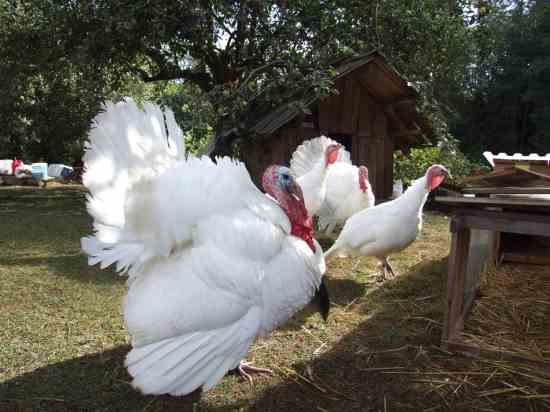
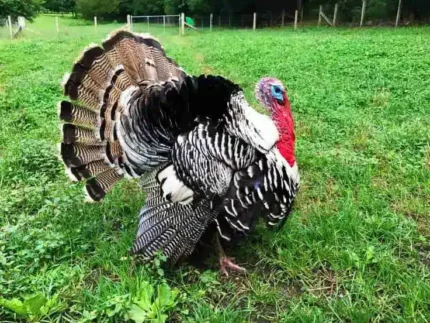
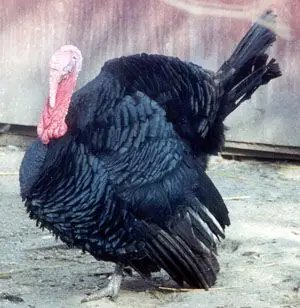
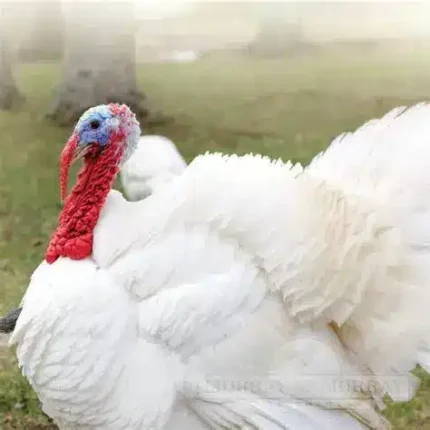

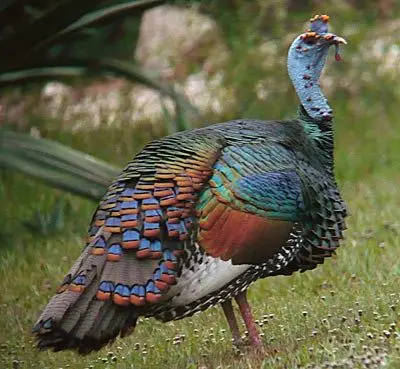
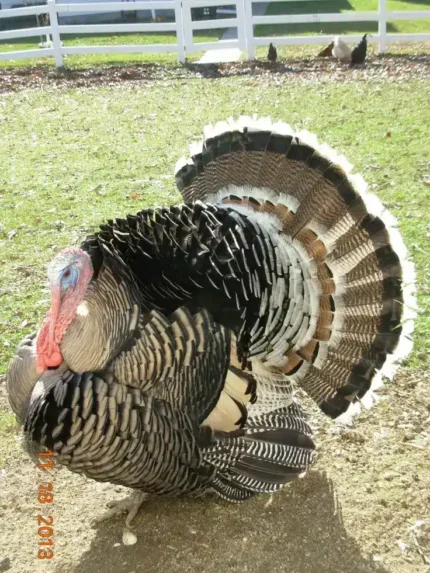
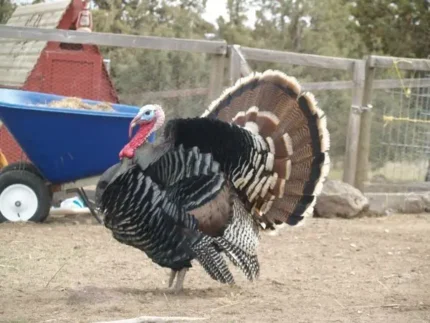
Reviews
There are no reviews yet.